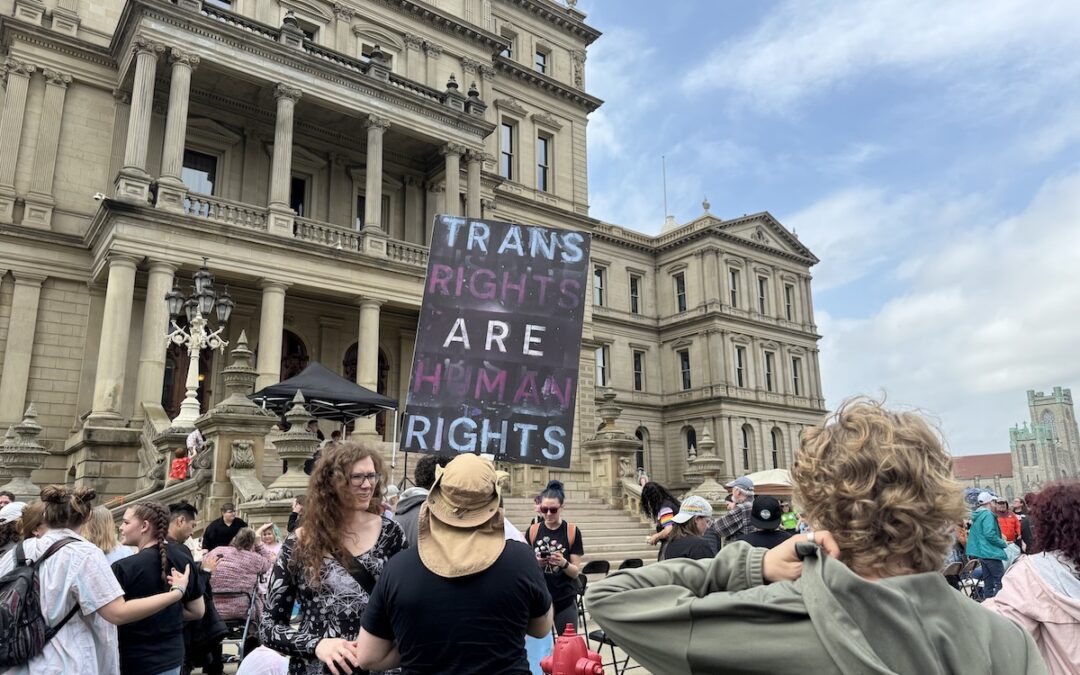
BY KYLE DAVIDSON, MICHIGAN ADVANCE
MICHIGAN—As President Donald Trump’s administration ends 988 crisis line support for LGBTQ+ individuals, members of a Michigan-based nonprofit are stepping in, offering support and resources to trans youth and their family members with a revamped hotline run by parents with trans children.
While Stand With Trans’ Ally Parents Hotline is not a crisis line, Roz Gould Keith, the organization’s founder, said the group is looking to offer love at the other end of the line.
“A lot of times people call and they just need someone to hear them, right? They just need someone to call them by their chosen name. They need someone to call them by the right pronouns and they don’t necessarily need more than that,” Keith said.
Sometimes a caller might need advice on coming out to their parents or information like where to find a chest binder, Keith said, and the support person on the line can help them find those resources even if they are not immediately available.
Stand With Trans’ mission is to support and empower trans youth and their loved ones, Keith explained, and one way to do that is to ensure parents are knowledgeable and have access to resources and support.
The organization’s Ally Parents program was initially put together in response to the death of Leelah Alcorn, a transgender girl who took her life in 2014 citing a lack of acceptance from her parents. Keith said she was in a Facebook group with other parents of transgender kids, when the idea first came together.
“We started talking and commiserating, and our hearts were just breaking over this unnecessary tragedy, and we said we have to do something,” Keith said.
Out of those conversations came Ally Moms, with the group publishing the first names of mothers of trans children, the state where they lived and a phone number where they invited young people to text them for support.
“There was really nothing out there in the way of resources, and so it was really groundbreaking at the time, and we started getting a lot of texts, and then parents started calling and it kind of expanded,” Keith explained.
The program became Ally Parents, and expanded to a network of 250 parents across the county in almost every state, Keith explained.
However, the program became unwieldy, as the organization didn’t have a phone system or a way to process calls, Keith said, with Stand With Trans taking a pause in promoting the program.
“It was still kind of there in the background. People could see the list on our website, but we didn’t promote it because we really wanted to figure out the best way to secure the calls,” Keith said.
When Stand With Trans received a grant in 2024, that’s when the hotline came into play, Keith said. The group was able to hire two co-coordinators who Keith said found the perfect platform to host the hotline.
“People can text or call the toll free number, and it’s for youth, it’s for adult caregivers, really anybody that needs to talk to an ally parent. And so this way it just kind of routes through to the next available person. So it just makes a lot more sense. We don’t have to put anyone’s name or phone number out on the internet,” Keith said. “It came at the best time, because now, with the trans hotline being eliminated, defunded, we’re offering this up.”
Tess Sokolis, one of the program’s co-coordinators, told the Michigan Advance in an email that she connected with Ally Moms in 2018 when her son was five years into his transition.
“To have found those resources and to have had this community available to us when our son was starting his transition would have been an absolute godsend,” Sokolis said.
Like many other ally parents in the program, Sokolis said her family faced several hurdles: working to find healthcare for her son after their family doctor refused to care for him; becoming estranged from family members; updating his name and gender on documents and accounts and seeking out colleges that not only offered gender affirming care, but also welcomed trans individuals.
“We did all of this blindly and by the seats of our pants, but we did it,” Sokolis said.
Alongside her co-coordinator, Dani Jackson, Sokolis said she was brought in to revamp the Ally Parents program amid an increasingly anti-trans political climate.
“Our process so far has been two-fold: one, contacting every Ally Parent in our database to reconfirm their commitment to the program as we worked to move it forward; and two, creating this hotline and learning it ourselves to then train our parents with the new phone system,” Sokolis said.
The hotline soft launched at the end of June, Sokolis said, giving them the opportunity to work out any hiccups with the program. Now, there are 30 parents on board to help accept calls, with others working administratively and more being brought on board, Sokolis said.
“We are saddened at the loss of other national LGBTQIA+ hotlines, but we are happy to give these kids and their loved ones a safe place to land as those are phased out,” Sokolis said.
For many trans youths, having a service like this can be life changing, Keith said, as many trans kids can feel isolated, especially when they don’t know anyone who shares their identity.
While transgender and nonbinary youth are at a significantly higher risk of suicide than their cisgender peers, research published in Transgender Health found that acceptance by at least one adult or peer significantly reduced that risk.
For parents, they face a very different journey when their child comes out as trans, Keith said. Even if they support their child unconditionally right out of the gate, they do not know how to find resources or what the next steps are, she said.
“It truly is life changing when we can offer up that kind of support,” Keith said. “I have a trans son who’s now an adult, but when he came out 12 years ago, we really were alone. There were no resources. And so I know what that feels like, and it is just, when you find one person you can talk to, you will remember that forever.”
In order for someone to volunteer as an ally parent, they must be the parent of a trans person, Keith explained. They must also fill out an application and undergo a background check.
Assuming everything goes well, those parents are then given access to training as well as monthly meetings, Keith explained.
“If answering the phone is not your thing—because some people don’t feel comfortable with that, right—then there are other ways that they can get involved,” Keith said.
Individuals can call or text 833-435-7798 to connect with the Ally Parents Helpline. Volunteers are available from 8 a.m. to midnight EST. While the service is free, standard message and data rates may apply.
READ MORE: Michiganders promise to fight like hell for transgender youth after Supreme Court ruling
This coverage was republished from Michigan Advance pursuant to a Creative Commons license.

University of Michigan Health ends gender-affirming care after DOJ subpoena
BY ANDREW ROTH, MICHIGAN ADVANCE MICHIGAN—The University of Michigan’s statewide hospital network will stop providing medically necessary gender...

Michiganders promise to fight like hell for transgender youth after Supreme Court ruling
Despite the Supreme Court’s decision in US v. Skrmetti, LGBTQ+ advocates remind ‘Ganders that gender-affirming hormone therapy is safe in...

2025 Pride: Michigan’s 10 biggest festivals & events
Here's your guide to Michigan's 2025 Pride events happening all month long (and beyond!). As Pride Month in June and International LGBTQ+ (lesbian,...

Michigan’s largest health care system resumes gender-affirming care for youth
After criticism from civil rights organizations, elected officials, and the LGBTQ+ community, Corewell Health will continue providing...

Federal judge denies request to ax Michigan’s ban on conversion therapy
BY ANNA LIZ NICHOLS, MICHIGAN ADVANCE MICHIGAN—A federal judge has rejected a request in a lawsuit to halt Michigan’s new law banning conversion...




